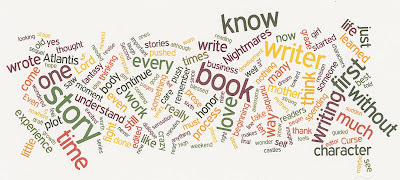My first adventure this year was through the Odyssey program I have mentioned earlier. What I find fascinating is that, when you are open for improvement and change, the opportunities come in the most unsuspecting places. Who would know I would actually learn a lot about my writing through a simple program online?
My mother, who teaches 2nd grade, has a “trash
bin" posted on a bulletin board for words that her students need to throw away. I think I need to put that
on my office wall. Words I need to add to that wall? “Looked” and “Eyes” most
definitely need to go there. I am disappointed to see the word “like” so big in
each of the pictures. It like totally like makes me like look like a valley
girl! Not all words were bad to see. I was excited to see theme words like
“dark,” “Lost,” and “hell” appear in The Lord of Nightmares. One shock was
seeing the name Jasper appear bigger than Nightmares. I would think the
Nightmares had more “airtime,” but, apparently, Jasper demands his own space.
In The Curse of Atlantis, I see “king” and “Atlantis” and
“horse.” I find it interesting the word “know” is so large. I guess that could
be a bad thing, but I wonder if it does speak to the characteristic of Nicias.
What also shocked me is how big “Sebastian” appears for a character who was
only prevalent in maybe a third of the novel. But, that is so fitting because
he really is the catalyst that moves the story along.
I even ran the machine on this blog. No surprises here. I
mean, if a writer’s blog didn’t have the words “writer,” “book,” and “Story”
pretty big, then it really needs to be closed down. I was fearful to see the
word “I” nice and big, but am glad I don’t even see it small. Maybe I’m not as
self-centered as I thought. :)
Besides being a fun adventure, I think I can learn a lot
about my writing through this activity. I can see into those pieces of my
process that are too close for me to critique on my own. The readers and
editors I have who do not shield their opinions and advice are invaluable. I
think this is yet another avenue in the pursuit of growing as a writer. Best
advice I could give to other writers: keep pushing and learning. This makes me
want to take more writing classes to see what other areas I can strengthen.


